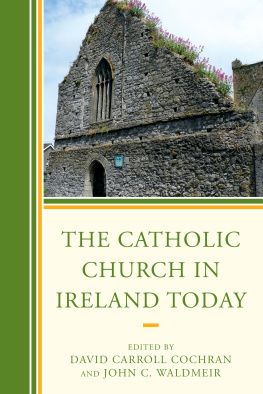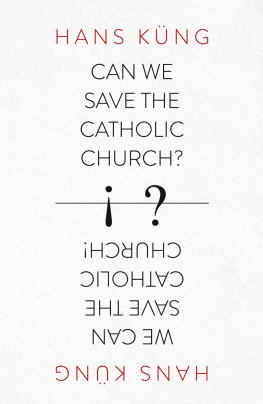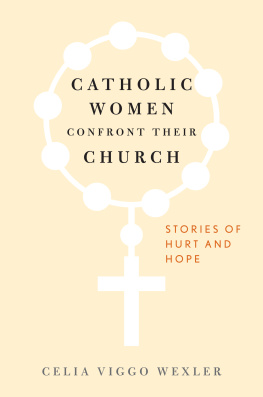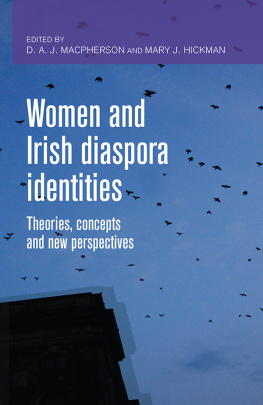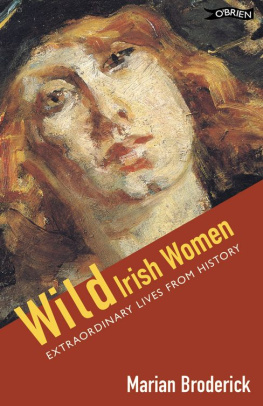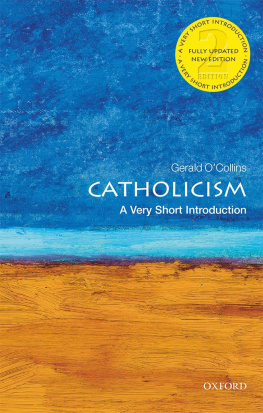IRISH WOMEN AND THE CREATION OF MODERN CATHOLICISM, 18501950
Irish women and the creation of modern Catholicism, 18501950
CARA DELAY
Manchester University Press
Copyright Cara Delay 2019
The right of Cara Delay to be identified as the author of this work has been asserted by her in accordance with the Copyright, Designs and Patents Act 1988.
Published by Manchester University Press
Altrincham Street, Manchester M1 7JA
www.manchesteruniversitypress.co.uk
British Library Cataloguing-in-Publication Data
A catalogue record for this book is available from the British Library
ISBN 978 1 5261 3639 8 hardback
First published 2019
The publisher has no responsibility for the persistence or accuracy of URLs for any external or third-party internet websites referred to in this book, and does not guarantee that any content on such websites is, or will remain, accurate or appropriate.
Typeset in Sabon by
Deanta Global Publishing Services
For my parents, Richard and Susan
Contents
I have benefitted from the assistance and support of many while writing this book. I would like to express my gratitude to the staffs of the following for their assistance with research: the National Archives of Ireland, Dublin; the National Library of Ireland, Dublin; the Dublin Diocesan Archives, Drumcondra; the John J. Burns Library, Boston College; the Galway Diocesan Archives; the Cloyne Diocesan Archives; the Kerry Diocesan Archives; the Limerick Diocesan Archives; and the National Folklore Collection, University College Dublin. The revisions for this manuscript were completed while I was on a Fulbright fellowship in Dublin; my thanks to the Fulbright Commission as well as Gerardine Meaney and the Humanities Institute at University College Dublin for hosting me. For additional financial support I thank the History Department and the School of Humanities and Social Sciences at the College of Charleston. I also am grateful to the editors of ire-Ireland , Lilith: A Feminist History Journal , tudes Irlandaises , the Journal of Family History , and Four Courts Press for permission to reproduce parts of previously published articles and chapters. The editorial team at Manchester University Press, especially Emma Brennan and Alun Richards, were enormously helpful and patient throughout this process.
I thank my amazing students at the College of Charleston and also wish to express my gratitude to my colleagues in the History Department, Womens and Gender Studies, Irish Studies, and the Womens Health Research Team. I am especially indebted to Phyllis Jestice for reading a draft of the entire manuscript and to the following colleagues for providing helpful insight along the way: Sandra Slater, Noelle Zeiner-Carmichael, Tim Carmichael, Bill Olejniczak, Chris Boucher, and E. Moore Quinn. The late Ruth-Ann M. Harris generously offered not only her mentorship but also her amazing Mill House, where I wrote several chapters one memorable summer.
Family and friends have sustained me in innumerable ways throughout the efforts that this book required. Thank you to Amy, Deb, Kelly, Derek, Jim, and Johnny; Ryan, Justine, Mackenzie, Madeline, Richie, Keegan, Ava, Lila, Evan, Natalie, Fiona, Finn, Niamh, and Owen; and Cassie, Noelle, Sandy, Moore, Rosalva, Izzy, and Kairo. To my father and my late mother, who always gave me the freedom to have a life of the mind, I am eternally grateful. And to Paris, the best decision Ive ever made: how can I express my thankfulness for your support every step of the way? Words are insufficient. Te adoro .
CDA | Cloyne Diocesan Archives, Cobh |
CEDA | Archdiocese of Cashel and Emly Archives, National Library, Dublin |
DDA | Dublin Diocesan Archives, Drumcondra |
GDA | Galway Diocesan Archives, Galway |
KDA | Kerry Diocesan Archives, Killarney |
LDA | Limerick Diocesan Archives, Limerick |
NAI | National Archives of Ireland, Dublin |
NFC | National Folklore Collection, Dublin |
NLI | National Library of Ireland, Dublin |
In the 1860s, a reporter from the Limerick Reporter and Tipperary Vindicator described the scene at a local holy well, where [a] few poor women were fervently repeating their prayers and going their rounds about the well. These accounts illustrate that lay Irish women came to represent faith and nation in the modern age. They testify to the central positions that lay women held in the religious worlds of nineteenth and twentieth-century Ireland even as they document both changes and continuities in how women practiced their faith from the post-famine decades to 1950.
In the immediate aftermath of the Great Famine, the Irish Catholic Church remained institutionally weak. Womens devotional worlds thus were syncretic intensely Catholic but also steeped in vernacular popular traditions including holy well devotions and fairy belief. By the late nineteenth-century devotional revolution (185075), when the Church reorganised and rebuilt, lay Catholic women came to occupy the public spaces of the parish and chapel in unprecedented numbers. And in the first half of the twentieth century, Irish womens Catholicism became not only popular but also material and commercial, bolstered by a remarkable flourishing of publications and devotional items including the rosary beads so beloved by Dublins mothers in the 1940s and 1950s.
Notably, lay Irish women played important yet understudied roles in the Church from 1850 to 1950. Women dominated daily lived religion and challenged the established patriarchy through their traditional socially constructed gender roles: church-goers, managers of the holy household, moral-imparting mothers, consumers and creators of devotional culture, correspondents, gossipers, philanthropists and activists, and community members. Amidst enormous political, economic, and social change, and even within a culture of intensified patriarchy, women persisted in occupying a central position in religious life throughout the period.
This book investigates the roles that lay women played in Irish Catholic life from 1850 to 1950. Nuns, for the most part, have not been incorporated into this study because their religious, material, and physical conditions differed from those of most lay women. Additionally, while several historians have investigated Irish women religious, lay womens roles remain almost entirely overlooked. Examining both urban and rural areas across the east, south, and west of Ireland, Irish Women and the Creation of Modern Catholicism, 18501950 analyses women throughout their lifecycles, including the sacred moments that characterised their girlhoods, the rhetorical strategies of Catholic mothers, and the recollections of older women reflecting on their religious memories. My study interrogates the intersections of gender, class, and religion and, whenever possible, integrates the examples of women from various social classes. This book notes key distinctions among women within the wide spectrum of regional, economic, age, and marital variances, yet it also highlights how Catholicism could unify lay women across these divides.


